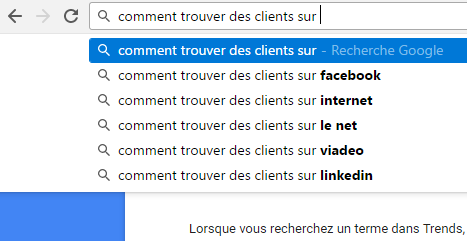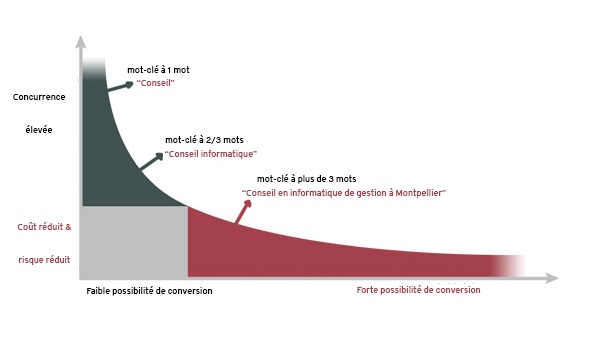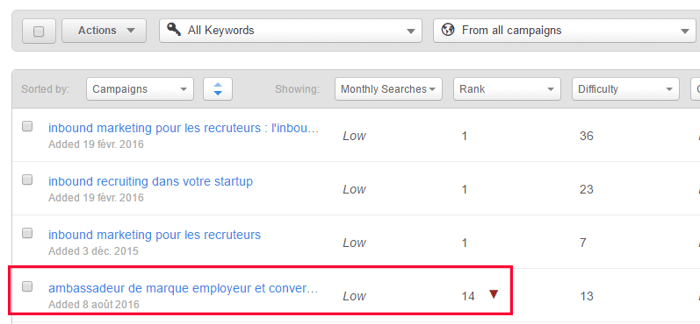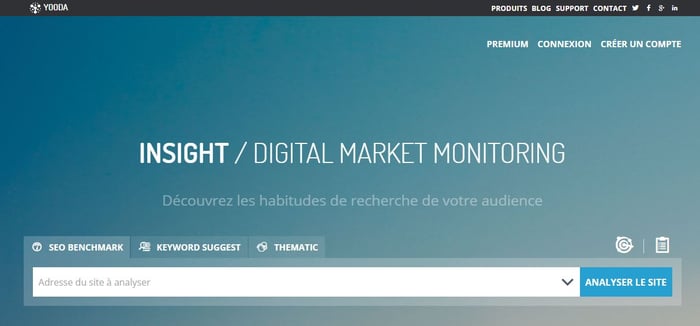For several years, content marketing or Content Marketing has been growing in popularity.
This translates into a significant increase in investment. In 2016, 83.8% of marketers increased their spending on content, realizing that quality content and optimized through SEO significantly increases traffic to their website.
In addition, these efforts drive up their brand awareness (commercial and employer). Nevertheless, only 54% of companies that do Content Marketing say it is properly integrated with their SEO.
What's the point of producing content to drive leads to a site, if the keywords used in that content aren't the ones actually searched for by your Buyer Persona?
Nothing, or almost nothing.
All efforts undertaken will have limited or no effectiveness!
That's why we're giving you three tips and several lists of solutions to target the relevant keywords for your business.
1. Use common sense and simple tools
This may seem like a no-brainer, but no one knows your business better than you do, nor the answer to this question:
"What should your customers type into their search engine to find you? "
This means finding topics directly associated with your service offering and finding keywords that could be used. It is important to distinguish in this step between spoken and written language. Indeed, your customers may express themselves verbally in one way and write in another when they are in Internet exploration mode.
To find out what these keyword sequences are, you can ask your customers or salespeople for feedback.
You could also use some of Google's features, including related topics and queries on Google Trends.

Another tip: use the suggested searches that appear when you type a sequence of words into the search engine.
This will help you come up with ideas related to the topic and words your customers are interested in.

This feature is also available on other sites like Amazon, Youtube, Wikipedia or Ebay as well as other search engines like Yahoo or Bing.
If you want to direct a specific clientele to your website bet on specific sets of keywords rather than general searches.
Simple keywords may certainly have high search volume but will likely be too common to attract the customers you are specifically seeking.
In addition, the simplest keywords are usually the most targeted by your competitors. This makes it more difficult to rank well with these in the SERPs (search engine results pages). In SEO, this is called the long tail, which can be visualized in red in the diagram below. 
In this example, a management IT consulting company based in Montpellier should focus on the keywords "management IT consulting in Montpellier" rather than "consulting" because it wants to position itself accurately.
2. Use advanced tools designed for keyword research
These tools are very useful for confirming (or disproving) the hypotheses and ideas made in the previous step.
They will help you better define certain characteristics of your keywords during the targeting process.You will then be able to better estimate their potential, their importance, their difficulty and the opportunity they represent.
Google Adwords Keyword Planner
It will give you lists of words associated with those you have already identified through their search history statistics. You will also know their search volume and estimated traffic.
Moz Keyword Explorer
Although new, Moz Keyword Explorer is a tool that acts similarly to Google's. It has the advantage of being faster and returning highly relevant results, thanks to a filter system.
SEMrush
SEMrush allows you to access and analyze data on the keywords your competitors are using. This will allow you to detect opportunities based on the words they aren't using, or try to rank better on the ones they are ranking on.
Hubspot Keyword
Once again, Hubspot's COS (Content Optimization System) shows its great versatility by integrating a powerful keyword research tool and, above all, directly interfaced with content management (blog) and campaign management Inbound Marketing.

It also allows you to view keyword opportunities, i.e., those for which your site is well positioned to appear on the first page in searches.
3. Use alternative tools to go further
There are many alternative tools that will help you choose your best keywords to differentiate yourself from your competitors.
Spyfu
It provides access to the keywords used by your competitors.
Advantage: It allows you to refine your searches while studying the competition.
Keyword tool
This tool helps you find "long tail" phrases (as explained above), whether they are popular on Google, Bing or Amazon.
Advantage: Your SEO will be optimized on multiple platforms.
Yooda
Yooda can produce thousands of keywords related to your domain. In addition to its undeniable qualities, this site has a special place for us, as it is a Montpellier-based company!
Advantage: It is multi-functional and also allows you to analyze the search engine optimization of your competitors.

Ubersuggest
Ubersuggest selects keywords from one or more terms, then suggests phrases related to your business.
Advantage: It presents the suggestions in a simple format, ideal for those who are new to Google AdWords and may feel lost in the interface.
Traffic Travis
Traffic Travis analyzes keyword trends related to your industry and your competitors' page rankings.
Advantage: It allows you to see your competitors' ranking and backlinks.
Keyword discovery
Like the others, it generates multiple keywords by topic.
Advantage: It offers the top 100 results retrieved from over 200 search engines.
Whostalkin
Whostalkin is a minimalist site that points to keywords it finds in conversations on sites, blogs, forums or social networks.
Advantage: It offers another, more social angle.
The need for a precise and dynamic content strategy
Whatever your business is, it is necessary that you have a well-defined Marketing content strategy.
To improve your web visibility, your content will need to be combined with optimized organic SEO through really searched and adequate keywords.
In addition, it is essential to update this optimization frequently by reviewing the value and popularity of these keywords.








